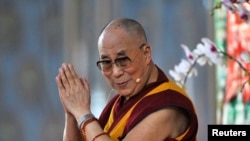The Chinese government has announced that a greater degree of autonomy for Tibet is "not up for discussion," casting renewed doubts on the resumption of dialogue between Beijing and the Tibetan spiritual leader, the Dalai Lama.
In a harshly worded white paper released Wednesday, China said the Dalai Lama must first abandon what it views as his attempts to provoke violence and create an independent state in Tibet - things the exiled leader vigorously denies supporting.
"Any negotiations will be limited to seeking solutions for the Dalai Lama to completely abandon separatist claims and activities and gain the forgiveness of the central government and the Chinese people, and to working out what he will do with the rest of his life," said the report.
"As the political status and system of Tibet is stipulated by the Chinese Constitution and laws, the 'Tibet issue' and 'a high degree of autonomy' are not up for discussion," it continued.
The Dalai Lama, who fled Tibet in the 1950s following a Chinese takeover, has for decades insisted he is not pushing for independence in his homeland. The Nobel Peace Prize winner says instead he is seeking greater autonomy and other rights under what is referred to as the "Middle Way Approach."
In the white paper, Beijing criticized the Middle Way as a deceptive attempt to "create a state within a state." It also said the recent wave of Tibetan self-immolations was "manipulated and instigated" by the 79-year-old and his supporters.
More than 130 Tibetans have set themselves on fire in Tibetan areas of China since 2009 as part of a desperate protest against China's rule and repressive policies in Tibet. China says the suicide protests are acts of terrorism.
The Dalai Lama and the Chinese government last held talks in 2010. In recent months, the Dalai Lama has said he is optimistic that Communist Party leader Xi Jinping, who came to power in 2012, could resume the negotiations.
One area of disagreement is over which party would represent Tibet. Beijing prefers to meet with the Dalai Lama and his representatives. The Dalai Lama, who retired from politics in 2011, says Beijing must meet with the Tibetan government-in-exile.
The Chinese government recently has stepped up its verbal attacks on the Dalai Lama. Most recently, it slammed the spiritual leader for suggesting he may not be reincarnated when he dies. Beijing exercises tight control over religious matters in China, and has said it alone can decide whether the Dalai Lama will be reincarnated.










